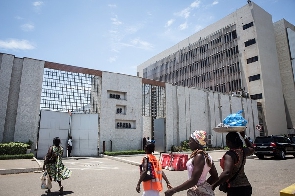Banks should brace for substantial credit losses, increased cybersecurity challenges and increased cost in keeping employees safe as the novel coronavirus (COVID-19) continues to wreak havoc on all sectors of the economy, a report by PricewaterhouseCoopers (PwC) has said.
The report, which assessed impacts of the coronavirus pandemic on the banking sector, paints a very grim outlook for the industry – especially operations and profitability – despite the measures put in place by the Bank of Ghana to cushion impacts of the virus on the financial sector.
Data on the banking industry’s credit exposure by sector in 2019 show that the services sector tops with 24 percent, followed by commerce and finance with 21 percent, and manufacturing 11 percent; meaning that any impact the pandemic has on these sectors will also reflect heavily in the banking sector.
The report says the most vulnerable sectors will, hence, be trade and commerce, hospitality and leisure, construction, oil and gas, education, transport and storage, and financial and insurance activities.
Therefore, the pandemic’s impact on these sectors will cause a general slow-down of economic activities, and will result in heightened risks for the banking sector that will reduce fee and trading income as well as put pressure on net interest income; higher credit losses and its attendant impacts on overall asset quality, capital and liquidity.
Other negative effects on the banking industry are cybersecurity breaches; operational constraints of keeping employees safe and meeting customer expectations; and IT and other support services deterioration because of internal challenges or vendor problems.
To mitigate these risks, PwC has proffered some priority areas banks should focus on. These priorities include crisis response and management which will develop reasonable and worst-case scenarios and their potential impact to support crisis and response planning.
Also, the report says banks should assess potential impacts and develop options to identify and move labour with the key skills to support profit and loss of the organisation; and proactively manage where, when and how disruption will impact the availability and effective utilisation of skills in the business.
Furthermore, the auditing giant says the strategy should develop a rapid communications plan and approach to build and maintain trust and reputation during the crisis for key stakeholders.
And on revenue, the report advises banks to revise their sales strategy to deal with evolving customer behaviour and competitive environment (risks and opportunities), and also prioritise actions to protect customer relationships and commercial interests.
When it comes to operations and supply chain constraints, banks must perform an operational risk assessment; consider and plan for the impact of disruption on critical business functions; and understand their COVID-19 supply chain risks and impacts, including third-party suppliers.
Due to all these anticipated impacts on the industry, the Bank of Ghana has introduced certain measures to cushion banks from some of the losses that will hit the industry as a result of the pandemic.
The measures include reduction of the Primary Reserve Requirement from 10 percent to 8 percent, to provide more liquidity for banks and SDIs; and reduction of the Capital Conservation Buffer (CCB) for banks from 3 percent to 1.5 percent.
It further reduced provisions for loans in the ‘Other Loans Especially Mentioned’ (OLEM) category from 10 percent to 5 percent for all banks and SDIs, as a policy response to loans that may experience difficulty in repayments due to slowdown in economic activity; and Loan repayments that are past due for Microfinance Institutions for up to 30 days shall be considered as ‘Current’, as is the case for all other SDIs.
The Bank of Ghana has also ordered banks and Specialised Deposit-Taking Institutions (SDIs) to suspend the declaration and payment of dividends or distribution of any reserves to shareholders – to ensure that banks and SDIs are better able to support their customers throughout the COVID-19 pandemic, and to absorb any potential operational losses for banks and SDIs from the COVID-19 pandemic.
Click to view details



Business News of Monday, 11 May 2020
Source: thebftonline.com

















